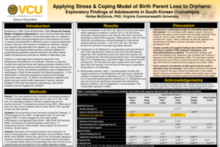Introduction
Brodzinsky’s (1990; Smith & Brodzinsky, 1994) Stress and Coping Model of Adoption Adjustment is one of the few empirically tested models specific to children in formal alternative care (i.e. adoption). The model posits the psychological loss of birth parents as a result of removal and placement in alternative care is a primary placement stressor. However, this stressor is mediated by children’s maturity and cognitive appraisal about the situation (i.e. being “adopted”). This stress and coping model provides a potential pathway for explaining how placement-specific stressors may affect mental health and behavioral outcomes for children in alternative care.
Children in orphanages also experience separation from birthparents when placed in an institution; however, to date few studies have explored stress and coping processes related to birth parent loss, particularly among social orphans who have at least one living parent. Hence, the present quantitative study of adolescents in orphanages in South Korea explored the following questions: (1) Do adolescents in institutions experience cognitions and feelings about birth parent loss? (2) What is the association between birth parent loss and mental health (depression, trauma), behavior problems (YSR total internalizing, externalizing), and school problems (school engagement, grades)?

